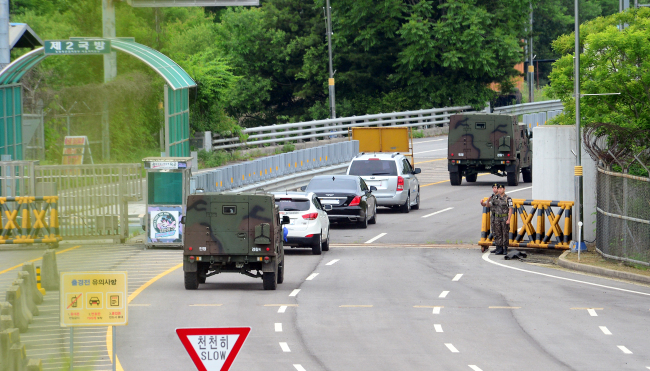Shares related to North Korea’s development, which had peaked in the wake of the inter-Korean summit in late April and US-North Korea summit in May, have continued to budge upward, albeit at a slower pace, according to local securities experts.
Among them was Hyundai Engineering & Construction, which has seen a steady climb in stock value since last week, pivoting on Hyundai Group chairperson Hyun Jeong-eon’s visit to Kumgangsan in the North to attend a private commemorative ceremony of her late husband Chung Mong-hun.
Having carried out some 710 billion won ($631 million) in infrastructure projects in North Korea in the past, the builder is deemed a key indicator in inter-Korean relations.
Closing at 58,200 won on Tuesday, the company’s stock price still remains far from its record-high 79,100 won in late May, but its uptrend has rekindled hopes on the resumption of the Kumgangsan tour program – one of its top revenue-making businesses in the North Korean region.
“Now that the short-term revenue gains from the series of summits in April-May have trailed off, it is the railway and road construction businesses that are likely to grab investors’ attention,” said Choi Seok-won, head of the SK Securities Research Center.
“Once the foundation for initial infrastructure is laid, companies related to gas pipes and other energy supplies are expected to rise as the next-step beneficiaries.”
Looking forward to the possibility of the North’s market opening, state-run banks and other financial institutions have been bustling to launch or expand inter-Korean economic cooperation teams or North Korea research centers.
“North Korea has advanced information technology but lacks the necessary system, especially in the financial sector,” said Cho Bong-hyun, research head for North Korean affairs at Industrial Bank of Korea’s Economic Research Center.
“Mobile banking may be the key factor for the North’s reform, which is why banks need to take pre-emptive preparatory steps.”
The expert also underlined the abundant natural resources in the underdeveloped communist region -- estimated at a total value of 4,000 trillion won -- and some 5,000 South Korean companies involved in the inter-Korean Kaesong industrial park.
But while the stock market and financial sector maintained optimism, the government remained more cautious on the prospects of advanced inter-Korean economic ties, especially in the latest context of Pyongyang’s continued engagement in military development.
A recently revealed confidential United Nations report claimed the reclusive regime is continuing to develop nuclear and missile programs in spite of incumbent international sanctions. It also asserted that the North has been transferring coal by sea, circumventing sanctions.
Cheong Wa Dae refrained from commenting on the given contents, in an apparent show of prudence concerning delicate inter-Korean ties.
“It seems inappropriate for the government to mention the details of a report that is not yet officially published,” said presidential spokesman Kim Eui-kyeom.
Overseas observers, on the other hand, have been more outspoken on calling out Pyongyang’s liability on denuclearization and halting ongoing economic talks.
“North Korea has done nothing to deserve the lifting of these sanctions. These are not flexible and we should not make them flexible,” Joshua Stanton, attorney and founder of OneFreeKorea.com, said in an interview with Voice of America.
Bruce Klingner, a researcher at Heritage Foundation, pointed out that Seoul’s government is exerting too much effort in the premature agenda of economic cooperation, while priority agenda items such as denuclearization measures have yet to take shape.
It was amid such persisting uncertainties that US Secretary of State Mike Pompeo, during his visit to Singapore for a regional security forum, criticized North Korea for violating UN sanctions.
The top official also reportedly said in a phone call with Seoul’s Unification Minister Cho Myoung-gyon in late July that “sanctions must be maintained” until solid confirmation of the North’s complete denuclearization.
Separately from its stern stance concerning the sanctions, however, the UN’s Security Council also adopted new guidelines Monday seeking to unblock humanitarian aid for North Korea.
By Bae Hyun-jung
(
tellme@heraldcorp.com)







![[Today’s K-pop] Blackpink’s Jennie, Lisa invited to Coachella as solo acts](http://res.heraldm.com/phpwas/restmb_idxmake.php?idx=644&simg=/content/image/2024/11/21/20241121050099_0.jpg)
